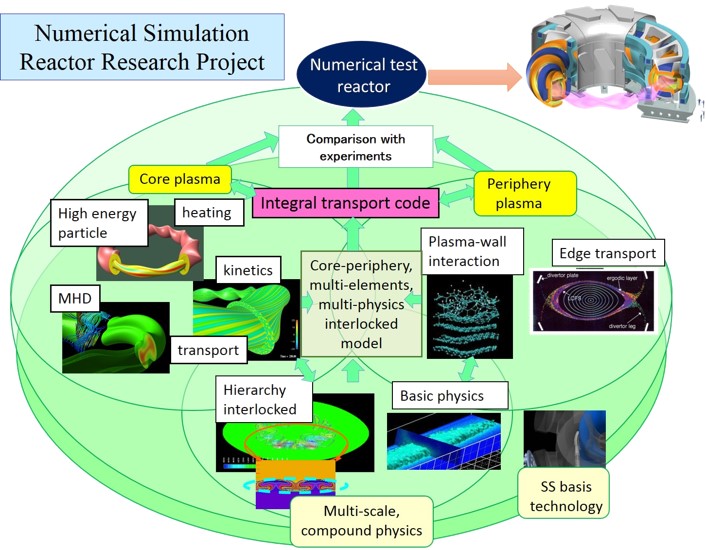Numerical Simulation Reactor Research Project
|
Based on the past two-decades activities at the Theory and Computer
Simulation Center and the Department of Simulation Science in the National
Institute for Fusion Science (NIFS), Numerical Simulation Reactor Research
Project (NSRP) has been launched to continue the tasks in the theory and
simulation research activities at NIFS, and evolve them in more systematic
way on the occasion of the re-organization of NIFS in 2010. Under intensive
international and domestic collaborations on large-scale numerical simulation,
the NSRP is aiming to understand and systemize physical mechanisms in fusion
plasmas and to realize ultimately the numerical test reactor (NTR) which
will be an integrated predictive modeling for plasma behaviors in a whole
machine range. For the realization of the NTR we need all element physics
contorolling fusion plasmas which is validated by the comparison studies
with experiments, and innovative numerical technologies to interlock them,
together with powerful supercomputing resources at the Petascale level
or more as a common platform of simulation science. And we should assemble
all obtained results to upgrade integral transport model and approach the
final NTR in the synergy of experimental groups and fusion engineering
groups.
In order to make this approach effective, eight research groups responsible for each task in the NSRP have been set up, which cover a wide range of simulation subjects including 3D equilibrium of core plasmas and its stability, high energy particle physics, plasma heating, plasma transport, micro and macro turbulence, burning plasma physics, fueling, periphery plasmas, plasma-wall interaction, other basic plasma physics supporting fusion science, and simulation methodology such as multi-scale simulation modeling, scientific visualization. The tasks of eight research groups are as follows. |
||
| 1. gPlasma fluid equilibrium stability grouph studies macroscopic physics of core plasmas such as MHD equilibrium, MHD stability, nonlinear global evolution of core plasma, and pellet injection using nonlinear MHD and extended MHD models. . 2. gEnergetic particle grouph investigates physics issues related to energetic-particles in toroidal plasmas such as Alfven eigenmodes, neoclassical transport of alpha particles in burning plasmas, and NBI/ICRF heating. 3. gIntegrated transport simulation grouph works on the development of core transport code in 3D configuration (TASK3D) and its application towards prediction of the overall time evolution of observable physics quantities in the plasma core. 4. gNeoclassical and Turbulent Transport Simulation Grouph studies physics issues related to turbulent transport in toroidal plasmas using theory and simulation based on fluid model, and investigate anomalous transport mechanisms, collisional transport mechanisms and multi-scale physics of transport, and predicts the transport level for achieving efficient confinement of high-temperature plasmas based on kinetic modeling. |
5. gPeripheral plasma transport research grouphstudies impurity transport process near a plasma facing wall in LHD based
on the model of boundary plasma between scrape-off layer (SOL) and divertor
plate. 6. gPlasma-wall interaction grouph investigates dynamical process on the surface of plasma facing materials such as chemical spattering of divertor plate and yielding hydrocarbon, by means of molecular dynamics (MD) simulation, and its extended model. 7. gMulti-hierarchy physics grouph studies complex multi-hierarchy phenomena relating to fusion plasmas by developing various multi-scale or multi-hierarchy models and numerical techniques. 8. gSimulation science basis grouph aims to develop innovative analysis tools of complex simulation data such as scientific visualization on CompleXcope, and various numerical techniques for utilizing powerful supercomputing resources. |
|

Concept of the Numerical Simulation Reactor Research Project.
|
||
|
Related publications
R. Horiuchi and NSRP members: gSimulation science at the National Institute for Fusion Scienceh, Plasma and Fusion Research, Special Issue on ITC20, Vol. 6, (2011) 2101055. |
||
|
|
R. Horiuchi, Executive Director of the NSRP |
|








 To NIFS
To NIFS